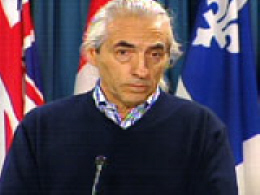 |

 |
 |

 |
August 22, 1997 Halifax Herald
Hopefully, Fontaine will be a people's person
Phil Fontaine
Ovide Mercredi, possessing very little personal experience with many aspects of Indian reserve community life, was first elected National Chief of the Assembly of First Nations by the Band Chiefs in 1991. Because of his lack of experience, I didn't expect much would be accomplished under his administration and there wasn't.
In order to carry out the duties of this type of position, it is imperative that a leader have the wherewithal to know what his/her people want. Being raised on an Indian Reserve is where this wherewithal is acquired. If one does not have the experience and knowledge to appreciate the frustrations of a People who are turned off with the performance of a political system, which was imposed upon them by outsiders, failure is guaranteed.
To be a successful Native leader, one must communicate one’s ideas effectively. This cannot be realized by adopting the "imperial" style of leadership which is, or was, the leadership style of many of the past and present prime ministers and provincial premiers of this country.
Thus, the day Ovide began to see himself as if he were a power unto his own, and not an employee of the Chiefs, was the day his goose was cooked. He became so imperialistic that in many cases, he wouldn't even answer communications from people who didn't agree with him.
His actions demonstrated that he was unaware of this fact: First Nations Peoples, because of their democratic heritage and the humiliating experiences suffered under the iron rule of Indian Agents, have a passionate dislike for dictators.
Mercredi's inability to communicate effectively and his ability to hear only what he wanted to hear were the main causes of his failure to convince First Nations Peoples of the need to approve the Charlottetown agreement and its self-government proposals.
Prior to the national poll, based upon my personal knowledge of the high level of mistrust the people held for our leaders, I, as Executive Director of the Confederacy of Mainland Micmacs, communicated to him my conviction that a recommendation by them for approval of the Accords would assure its defeat.
The National Chief's response to my warning was that he had the support of the vast majority of chiefs and, therefore, was confident that the votes of the People would be delivered. I just shook my head at the incredible naivete of the man. When the ballots were counted, my prediction proved to be very accurate. The overwhelming majority, 85 to 90 percent, said “no” to the Accords.
The white leadership of this country should take note from this. Just because an idea has the support of First Nations Chiefs, it doesn't necessarily mean it has the support of the First Nations People. On the other hand, I suppose it would be to much to hope that they will take note, because Mercredi's practice of imperially ignoring the wishes of the First Nations Chiefs and People was an exact copy of the imperial practices used by them to ignore the wishes of the Canadian population as a whole.
With Mercredi's July 29th. defeat and the election of Phil Fontaine as his replacement, I believe the prospects for positive progress in resolving the problems faced by First Nations Peoples in this country have improved tremendously. Fontaine, who was raised on an Indian reserve and is a veteran of residential schools, has intimate knowledge of the aspirations and hopes that First Nations Peoples harbour for their future, and he is very familiar with the workings of the Indian Affairs Department.
From the onset of his term, I hope he is wise enough to realize that for us to achieve our ultimate goal of self-governance, we need to have the support of the majority of our non-native brothers and sisters. To secure this support, he will need to engage in a major public relations undertaking, such as that undertaken by Grand Chief Coon-Come in his successful bid to win public support for Cree efforts to control hydro development in Northern Quebec.
The confrontational stance taken by Mercredi and many Chiefs over the past few years has not been productive. It has turned-off many non-native supporters and brought progress almost to a standstill.
First Nations citizens cannot grow and prosper in isolation or by being in a state of constant confrontation with non-natives in this country! Chiefs need to get pertinent information out to non-natives about the validity of our causes, which hopefully will persuade them to lend their support. Without this support, acceptable solutions for our problems shall not be found.
Education, legal actions and negotiations, accompanied by a healthy dose of common sense, will win the day for us - not confrontation.
The inequities created in Native communities by the Canadian government's imposition of the British form of imperial governance, and the corruption it often spawns therein, have instilled among First Nation Peoples a deep mistrust of their leaders. To succeed in winning back the trust of the People, the young in particular, the Chiefs and other Native leaders must accept that a return to traditional forms of democratic governance is imperative. Under the tenets of these democracies, the people ruled - not the leaders. Leaders were considered equals among equals - not elites.
To cure the problems caused by dictatorial leadership, First Nations citizens need to find people to lead who are true servants of the people. Hopefully, Fontaine will be such a person
Daniel N. Paul